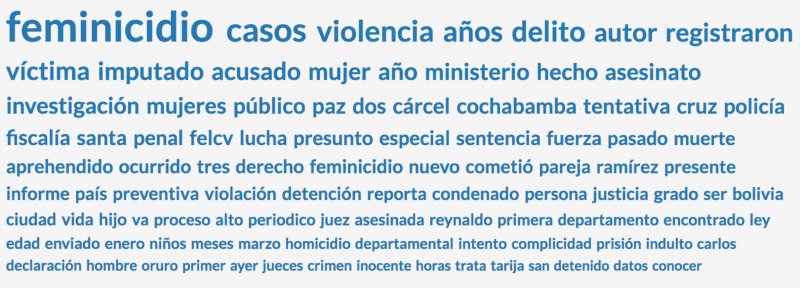“Above all to treat the issue with humanity”

The Reframed Stories Project asks people to respond to dominant themes and issues that appear in news coverage about their communities. These stories are reflections by people who are frequently represented by others in the media. Word clouds are created using the Media Cloud platform, a data analysis tool which examines a collection of media outlets over a specific period of time, allowing participants to analyze and discuss the preliminary insights into how they might be represented in the media. The project refrains from making conclusive pronouncements about the data, and instead is a starting point that creates space for discussion about how they can help shape their own media representation through digital media.
Natalia Montoya is a member of Colectivo G, which “builds, manages, and implements social projects; mainly in the field of Gender with a Human Rights approach” and is based in Cochabamba, Bolivia. The following is Natalia's analysis of the word cloud for the term “feminicidio” (feminicide).

Dominant words from 1,540 articles published between May 2017 and May 2018 mentioning “feminicidio” within 2 Media Cloud collections of Bolivia’s Spanish-language media outlets. (view larger image)
La realidad actual que nos muestran esta nube sobre feminicidios nos reflejan por un lado una falta de sensibilización respecto a la temática, ausencia estatal a momento de crear políticas públicas que garanticen verdaderamente los derechos a la no violencia hacia las mujeres; y por otro lado la ineficacia de nuestro sistema legal.
¿Qué quisiéramos encontrar?
¿Qué deberían reflejar los medios respecto a este tema?
Que se está utilizando todos los mecanismos a nuestro alcance para hacer justicia. Que el Estado toma acción y genera políticas públicas que precautelan los derechos de las mujeres y niñas, además de políticas de educación encargadas de romper con las estructuras patriarcales y machistas vigentes. Por último que como miembros de la sociedad civil asumimos el compromiso de combatir la violencia, de sensibilizarnos con las víctimas (directas e indirectas) y sobretodo de tratar la temática con humanidad.
The current reality shown by this word cloud for feminicide reflects the lack of awareness about the issue, an absence of the State when creating public policies that truly guarantee the right to non-violence towards women, as well as the inefficiency of our legal system.
What would we like to find?
What should the media reflect on this issue?
That we are using all the mechanisms at our disposal to achieve justice. That the State should take action and create public policies that protect the rights of women and girls, as well as educational policies tasked with taking down patriarchal and sexist structures. Finally, as members of civil society we are assuming the commitment to combat violence, to sensitize ourselves with the victims (direct and indirect) and above all to treat the issue with humanity.
This is part of a Rising Frames series developed as part of an activity organized by Raisa Valda Ampuero of Warmi.Red and Fabiola Chambi. They helped organize a workshop held on May 30, 2018 in Cochabamba, Bolivia that brought together representatives from various collectives and groups to examine how they or issues they care about are represented in a Bolivia media collection and created stories in response to that representation.
Support our work
Since Rising Voices launched in 2007, we’ve supported nearly 100 underrepresented communities through training, mentoring, microgrants and connections with peer networks. Our support has helped these groups develop bottom-up approaches to using technology and the internet to meet their needs and enhance their lives.
Please consider making a donation to help us continue this work.



